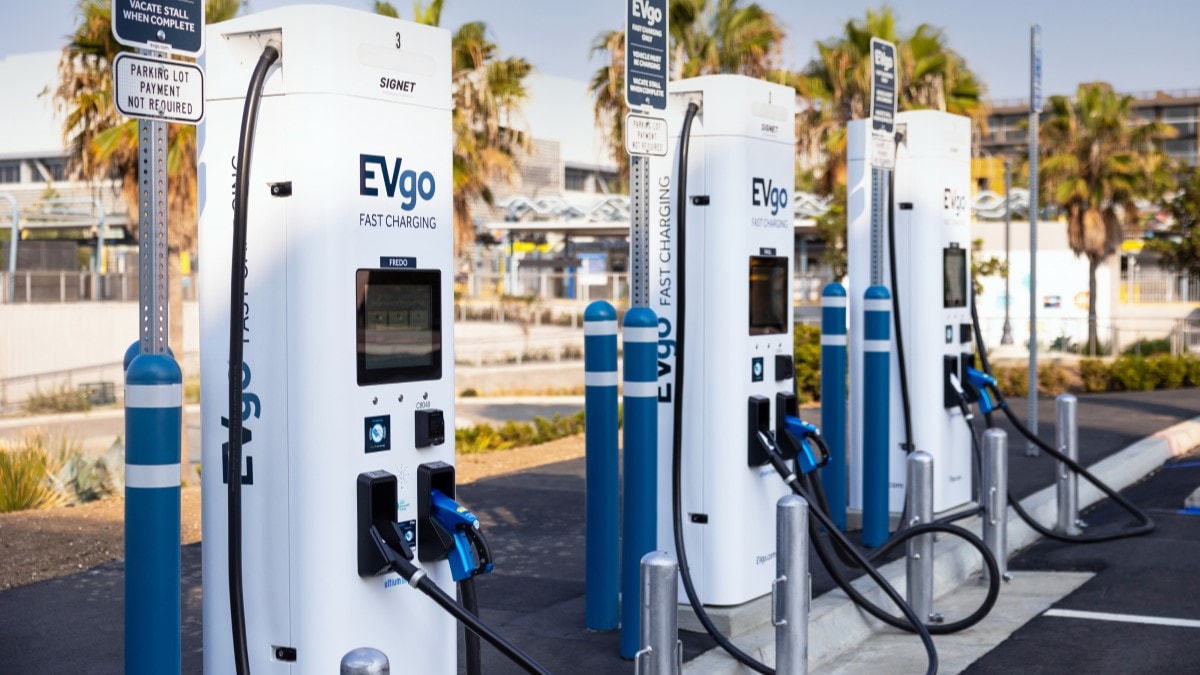Public electric vehicle (EV) chargers will outnumber gas stations in the U.S. by 2032, according to a new report. Analysts from Bloomberg Green explain, “At the current pace, public fast-charging sites will outnumber gas stations in the US in about eight years — but charger momentum is only expected to accelerate.”
We’re Building More Chargers…
The number of publicly available EV chargers in America rose 9% in the last three months, Bloomberg Green reports. “Meanwhile, charging stations are now getting busy enough to start making money.” A recent study from Stable Auto found that “a charging station must be pumping electrons around 15% of the time to turn a profit.”
Related: EV Chargers – Everything You Need to Know
In the first quarter, the average station was plugged into a car about 18% of the time.
…And Closing Gas Stations
America’s massive number of gas stations, meanwhile, is in steep decline. Shubhendra Anand, vice president of research and strategy at Market Research Future, told CNBC in 2023, “Gas station numbers have been decreasing at a sharp rate in the past three decades, and the trend is expected to continue in the coming years.”
Related: How Much Does It Cost To Charge An Electric Car?
Few Gas Stations Will Convert To EV Charging
The obvious solution – converting gas stations to public charging stations – will not work for many locations.
Gas stations are designed to serve customers for three or four minutes at a time as they fill up and leave quickly. They’re spread all over highways, cities, and towns because Americans can’t refuel at home and might need to stop during a long road trip or a short ride to the pharmacy. Some gas stations do brisk business selling coffee and snacks. But few Americans plan to stop at a gas station for a long time, and a few pumps can serve dozens of cars per hour.
EV charging is a much slower process. Plugged into the fastest of chargers, most EVs still require longer than half an hour to refill. An EV charging station doesn’t see the quick turnover of a gas station. It does see drivers parked for long stretches when they’re even more likely to need a meal, entertainment, or a restroom break.
A small-footprint gas station doesn’t convert easily into a profitable EV charging location.
Instead, chargers make more sense at places Americans already stop for long stretches, like shopping centers and movie theaters.
Little Charging Will Happen In Public
At some point in that 8-year time frame, the number of gas stations closing will exceed the number of EV chargers added to the network. America will never need as many public EV chargers as it has gas stations.
Fewer EV owners than owners of gas-powered cars will need to refuel in public. A recent government study found that a mature charging network designed to serve a fleet of tens of millions of EVs could be almost entirely located in private homes and workplaces.
Just 4% of chargers in a mature charging network might be public. EV owners, after all, rarely recharge mid-trip. They plug in when they get where they’re going.
The Early 2030s Will Be a Transformational Time
Bloomberg Green’s estimate says public EV chargers will outnumber gas stations in 2032.
The federal government, several state governments, and the shifting attitudes of consumers themselves all seem to be on a similar timetable.
Not every automaker has set a public goal for the day they’ll sell a mostly EV lineup. But some have. And the dates they have set all cluster around 2030 (Mercedes-Benz, Volvo, Genesis, and others) or 2035 (General Motors).
Many government goals, meanwhile, also target the early 2030s. New federal tailpipe emissions rules passed in March would require most automakers to build a more-than-half-EV lineup by 2032.
New federal fuel economy rules have a similar target.
And seven states have passed laws banning the sale of new gas-powered cars after 2035.
Drivers are on roughly the same timeline. A recent study from Kelley Blue Book parent company Cox Automotive found that 80% of EV skeptics expect to be open to an EV by 2034.








